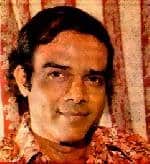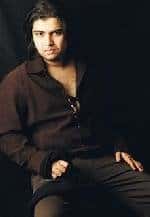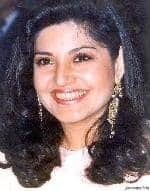Ahmed Rushdi Urdu and regional playback singer

Ahmed Rushdi, born in April 24, 1934 – April 11, 1983 was a versatile Pakistani playback singer who worked in film music and was “an important contributor to the Golden Age of Pakistani film music.” Rushdi is acclaimed as one of the greatest singers ever lived in south asiaand was a natural baritone, yet could sing high tenor notes with ease. Born in Hyderabad Deccan, he migrated to Pakistan and became a leading singer in the Pakistan film industry. He is considered to be one of the most versatile vocalists of the subcontinent and was capable of singing variety of songs. He is also considered to be the first regular pop singer of south asia and credited as having sung the “first-ever South asian” pop song, “Ko-Ko-Ko-reena.”
In 1954, he recorded the official National anthem of Pakistan with several other singers.Rushdi has recorded the highest number of film songs in the history of Pakistani cinema in Urdu, English, Punjabi, Bengali, Sindhi and Gujarati languages. He suffered from poor health during the latter part of his life and died of a heart attack at the age of 48, after recording approximately five thousand film songs for 583 released films. Besides popular music, Rushdi also helped popularize the ghazals of Naseer Turabi.
In 2003, 20 years after his death, Pakistani president Pervez Musharraf awarded him the Sitara-e-Imtiaz, the “star of excellence,” an honour given for distinguished merit in the fields of literature, arts, sports, medicine, or science. A street in Gulshan-e-Iqbal, Karachi, also named Ahmed Rushdi Road.
Early life
Ahmed Rushdi was born to the family and religious conservative in Hyderabad Deccan in 1934. Aware of his father, Syed Manzoor Ahmed, Arabic, and Islamic history and Persian language at the Faculty of Aurangabad, Hyderabad, Deccan. Rushdie died when he was just six years. From an early age, and was fond of listening to Rushdie, music programs, including the songs, which were broadcast from the radio. The music is not inherited from any one, nor ever was affiliated to any body in his family to the music. Impressed by the singing talents of Ahmed Rushdie, a very close friend of his father, who he described as his uncle, who loved him very much. Enrolled in the local music academy in Hyderabad Deccan.Moreover, two popular composers at that time, MA Rauf and Iqbal Qureshi, and music as taught in the same school. Thus, I learned the basics of Ahmed Rushdie music from the teachers mentioned.
Ahmed Rushdi did not get any kind of formal training of classical music is not before nor after the singer became a successful run, but he was to lead to an effective high and low notes. Sang his first song in Ibrat Indian cinema in 1951 and obtained a confession. His family moved to Pakistan and settled in the city of Karachi in 1954, where he began participating in variety shows, programs and music, children’s programs on the radio. In 1954, he recorded for the first time a movie is the song “Bandar same way Keemari”, written by Zuhair Mehdi to the popularity of Radio Pakistan to show minimum Bachchon, the song was a great success and has become a way to provide in the future to Rushdie.
Singing career
After the success of “Bunder Road se Keemari”, Rushdi was offered songs as a playback singer for films and quickly gained popularity.[13] He lent his voice to many hit films like Bara Aadmi (1956), Wah Rey Zamaney (1957), Raat Ke Rahi (1957), Yeh Dunya (1958) and many more. Rushdi got well recognition for singing “Mari lela ne aisi” in Anokhi (1956), “Chalak Rahi Hain Mastiyan” and “Chal Na Sakey Gi 420” in Raaz (1959). In 1961, he sang the popular song “Chand Sa Mukhra Gora Badan” in the film Saperan, for which he received his first Nigar Award as Best Male Playback Singer. He further strengthened his status as one of the top male playback singers in Mehtaab (1962), in which he sang “Gol Gappay Wala Aaya” for actor Alauddin; they would again be teamed in Susral. In 1966, he sang “Ko Ko Koreena”, considered the first modern Pakistani pop song.
Anchal was the movie (1960) film is important in your career and Rushdie. Recorded music director Khalil Ahmed number of very sad, “Casey shaman Mai Raho Tom” in the singer’s voice sound satisfaction, but he wanted Rushdie to re-register as the song was not satisfied with satisfaction in singing sound. I did, and Rushdie, the song recorded in Hebron itself satisfied with the composer. Has been influenced satisfaction in a career as a singer and determination at a later time. After that, whenever Rushdi Khalil has composed music for any film, his first choice. The mid-1960s saw the rise of great singers such as Mehdi Hassan and Masood Rana, but did not affect the profession Rushdie, and he is keen to lead the film music.
Music experts including Bazmi Nizar, Sohail Rana Muhammad Ashraf and there was a consensus of the most appropriate voice for each Rushdie comedy, the hero, and even character actor. He lent his voice to a single Murad, Nadim, Santosh Kumar, Darpan, Habib Abdul Rahman, Ghulam Mohiuddin, and was designed specifically for each representative of the film industry. And ideally to suit the voice of comedians such as Rushdie, Munawar Zarif, Lehri, Nirala, Nanha and Rangeela.
Rushdie recorded on the gazelle “thorn-E-awargi” written by poet Habib Jalib to Mr. Kamal the actor in the movie the Joker in 1963. Gained Ghazal sung by Rushdie, popular among music listeners. Rushdie and Jalib teamed together again to Muhammad Ali in the film Khamosh Raho (1964). Rushdi sang of a gazelle “Mai Nahi Manta” for the same film and got Habib Jalib in all parts of the country famous. He recorded qawwali “Madiney Ku Li MERA peace kehdena” side by side with the Sunnis Munir Hussein himself.
Actor Nadeem’s first film as a leading actor was Chakori (1967). Rushdi recorded four songs for this film in the composition of music director Robin Ghosh.[18] “Kabhi toe tum ko yaad ayen gi”, “Pyare pyare yar humare” and “Tujhe chahein meri bahein”. Same year, film Doraha and Shehnai were released. He recorded all the songs for these films including “Bhooli hue hoon dastan”, “tumhein kaise bta doon”, “Han issi mor per” (film Doraha) and “Tujhey apney dil se mei kaise”, “Nazaron se haseen hai”, “Dunya mei tumko jeena hai agar” ( film Shehnai).
In 1968, Rushdi recorded his first ever Bengali song in the film Notun Name Dako of Dhaka titled “Ke Tumi Ele Go”, which became a smashing hit in the then East Pakistan. He sang playback hits in the same year like “Ae mere diwaney dil” (film Jahan tum wahan hum), “Socha tha pyar na karein ge” (film Ladla), “Usey dekha usey chaha usey bhool gaye” (film Jahan tum wahan hum), “Teri aankhon ke bheegey sitarey” (film Ma Beta) and many more. Same year, Rushdi recorded a song “Salam-e-mohabbat” for Mohammad Ali in Khawaja Khurshid Anwar’s composition.
Rushdie Murad sang a single song in 1969 movie Naseeb Apna Apna.The “AE ABR-E-kaaram Aaj Etna Paras” brought another Nigar Award for the song was composed him.The Lal Mohammad Iqbal. He also won prizes for different songs such as “Dil Hai Tomko Dia de” and “Hum se bigar NA Aye larki”. About the same year, he sang a duet with the money in the Baharei Filmfare GI ayen gorgeous, “Khush naseebi Hi Mary.”
In 1969, the film was released nightingale. Ahmed Rushdi record all the songs for the Murad one in this film. The song “Kush record rooth Kerr gorgeous” blow. And his version was sung by Noor Jahan sad. Although he sang all the film’s hero in Pakistan, and confirm the association with Murad single to be the most popular, in films such as Armand (1966), and the song “Akele Na Jana” of this film in the composition of Sohail Rana earned Rushdie last award Negar. Were composed well-known effectiveness of Rushdie depicted on Murad single such as “delay Rahi Hai mujhey Aaj ajnabi panic valid” or “Kush loag rooth bilateral Carr” by Bazmi Nazar, composer of the legendary Pakistani movies.Ahmed pair Bazmi Rushdie, and Nizar was the group, Ahmed Rushdi, Sohail Rana two pairs of the most successful singer and music director of the film music of Pakistan.
Bring in new faces like Alamgir 1970s, ethics Ahmad, Ghulam Abbas, and other Nayar But Rushdie is still the leading singer in the film industry. The film was released Bandagi, Naag Muni and Bazi in 1971. The Ahmed Rushdi 1 Run in all three films. [23] It also won many awards for songs such as “Ike naar albeli socialism” (Naag Muni), “Tom ajnabi gorgeous ho” (Buzzy), and “Poocho NA hum bag northeast Yeh” (Intezar). Perhaps, the song never rang true below as it did after the demise of Ahmed Rushdie, saying: “chore chore hum chalay chalay if Shahr tumhara chalay chore”, film, Veer Chand Nikley Ga (1970), music, and Sohail Rana.
Rushdi sung four solo songs and one duet for Waheed in the film Khalish (1972). “Honto pe tera naam”( with Mala), “Kal achanak jo sar-e-rah mili thi”, “Ghussey mei gulabi gaal” and “Pyar hota hai”. Music director was M.Ashraf. Around the same year, he sung for Mohammad Ali in the film Mohabbat. Rushdi recorded three songs in the film including a sad song “Khudara mohabbat na karna”. Music director was Nisar Bazmi.
In 1973, he recorded a qawwali “Dil torney waley” for the film Mehboob mera mastana. Ahmed Rushdi also recorded a romantic number ”Teri jabeen se chodhwin ka chand jhankta rahey” (film Nadan) for actor Rehman. He recorded a sad song “Angara mera mann” for film Jaal which was released same year. He was also fond of acting and appeared in thirteen films as an actor including Anokhi (1956), Kaneez (1965), Saat Lakh (1967) and Dekha Jaye Ga (1976). He also composed a music album in singer Mujeeb Aalam’s voice.
Ahmed Rushdi is considered to be the first regular pop singer of south asia as he introduced hip-hop, rock n roll, disco and other modern genres in South Asian music and has since then been adopted in Bangladesh, India and lately Nepal as a pioneering influence in their respective pop cultures. Following Rushdi’s success, Christian bands specialising in jazz started performing at various night clubs and hotel lobbies[2] in Karachi, Hyderabad, Mumbai, Dhaka and Lahore. They would usually sing either famous American jazz hits or cover Rushdi’s songs. Rushdi sang playback hits along with Runa Laila until the Bangladesh Liberation War when East Pakistan was declared an independent state.
Because of Ahmed Rushdi, Pakistani music industry has steadily spread throughout South Asia and today is the most popular genre in Pakistan and the neighbouring South Asian countries. Pop icons like Alamgir and Muhammad Ali Shehki later on followed Rushdi’s landmarks in playback singing.
Personal life
Marriage
Ahmed Rushdi got married to Humera on November 30, 1963. His wife died in 1992, nine years after Rushdi’s death. He belonged to a Sayyid family (a sacred cast in muslims) and was a religious person. Despite of his popularity and fame, Rushdi never had any scandal in his entire career. He had three daughters. His younger daughter, Rana Rushdi used to sing her father’s songs in his presence which always pleased Rushdi a lot.[citation needed] He was against allowing his daughters to adopt singing as a profession. Ahmed Rushdi and Noor Jahan were highest paid singers in their time but Rushdi did not charge those producers and music directors a single rupee, who could not afford him. Famous music director Lal Mohammad made his entry into Pakistan film industry because Rushdi introduced him to different producers which he disclosed after Rushdi’s death. Likewise, poet Masroor Anwer got his first film as Rushdi insisted the music director Manzoor-Ashraf to give Masroor a chance.
Last years
In early 1980s, Rushdi shifted to Karachi as he was not feeling well and wanted to have a proper heart treatment. He was also singing less for films and film music itself was facing a decline. The 1980s saw a nose-dive in the progress of cinema in Pakistan. Number of cinemas decreased rapidly and people preferred watching television over going to a cinema.Playback singing that once was popular now struggled to exist and the singers needed a new medium to start afresh. Even then, Rushdi’s demand and popularity was still there with the music directors. He opened a music academy in order to teach music and playback singing to youngsters. Ahmed Rushdi never faced downfall as far as his singing career is concerned.
Until the 1970s, Rushdi was one of the leading voices in the subcontinent. In his last years, a weakened Rushdi, suffering from heart disease, recorded fewer songs on his doctor’s advise.
Death
Since 1976, Ahmed Rushdi was a heart patient and his doctors advised him to abstain from singing but Rushdi refused by saying that music was his life. When he had a second heart attack in 1981, he was composing a musical album in the voice of singer Mujeeb Aalam. On the night of April 11, 1983,he had a third heart attack. He was immediately taken to the hospital but pronounced dead by the doctors. He was 48. Rushdi was buried at Sakhi Hassan Graveyard, Karachi. His last non film song was “Aaney walo suno” which was a duet with Mehnaz.
On his death, actor Waheed Murad said. “Today I have lost my voice.”After Rushdi’s death, Waheed Murad as well as other friends and singers had appeared on a show to pay him a tribute; many of those same people appeared on the show six months later, reminiscing about Waheed as he also died.
Ahmed Rushdi Pictures
|
|
|










